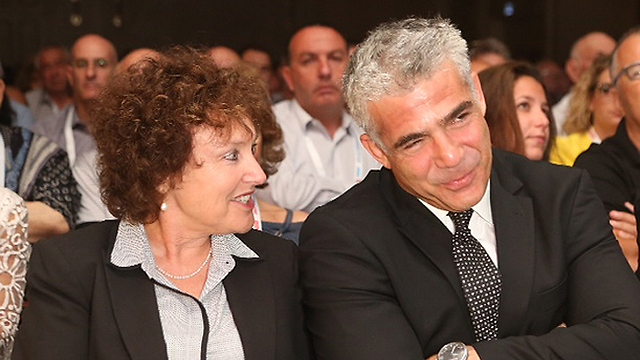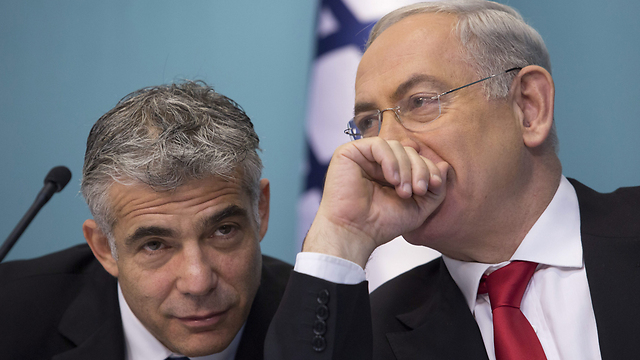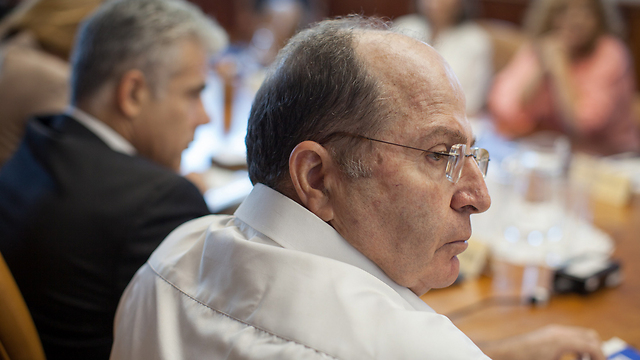
Netanyahu, Lapid fail to reach decision on 2015 budget
Top Yesh Atid source says that despite lack of decision, sides will find 'creative solution' so both Lapid, Netanyahu can claim victory.
No final decision was taken on an injection to the defense budget at the Sunday afternoon meeting between Prime Minister Netanyahu and Finance Minister Lapid. The discussion was professional and remained on topic, though the pair did not reach an agreement and are scheduled to meet again.
At the end of the meeting, the negotiating teams from the prime minister, finance minister, and defense minister continued to deliberate in preparation for the upcoming meeting.
A senior official at Yesh Atid told Ynet that the education, health, and welfare will increase in 2015. He noted that the conversations between Netanyahu and Lapid were expected to continue for a few days, and said he believed the two will find a creative solution that would gradually answer the needs of the defense establishment.
"They will find a way to inject cash to defense, so that Netanyahu could say he succeeded and Lapid will say he did not raise taxes and passed the zero percent VAT."
Prime Minister Benjamin Netanyahu and Finance Minister Yair Lapid met Sunday in an effort to consolidate their understandings on the 2015 state budget.
Lapid told reporters on Saturday that he is submitting a social budget that includes his zero percent VAT plan which would exempt young couples from VAT on the purchase of their first home.
"We believe we're close to an agreement. The objective is to submit the budget to the government as early as possible so we could move on to improving the Israeli economy and the situation of Israeli citizens," Lapid told reporters outside his Tel Aviv home.
Over the weekend, it was reported the defense budget will receive a NIS 6 billion increase, instead of the NIS 11 billion it had initially demanded, so its basic budget would start at NIS 62 billion.
Sources close to Defense Minister Moshe Ya'alon, however, said Saturday night that "at the moment, there's no deal. There haven't been any agreements about the defense budget. Discussions are still ongoing."
Netanyahu has put a lot of pressure on the finance minister in recent weeks so he would agree to the Defense Ministry's demands, but Lapid insisted the Defense Ministry doesn't need such a high budget increase, proposing a mere NIS 2.5 billion addition instead.
However, sources close to Lapid hinted last week that there was room for a higher increase to the defense budget, so long as it is lower than NIS 11 billion and would be a one-time addition serving a specific need, rather than an addition to the basic budget. In addition to that, Lapid demanded the defense budget increase will not be funded by raising taxes or making further cuts from civilian budgets, but by increasing the deficit.
The agreement on a NIS 6 billion increase to the defense budget is a significant achievement for Netanyahu. Despite the fact it is a lower increase than what the prime minister initially demanded, and half of what the defense establishment has asked for, it's still a fairly high sum - three quarters of the total amount of increases to the 2015 budget, that stand at NIS 8 billion.
If the defense budget does indeed receive only a NIS 6 billion increase, which would mostly be made possible by increasing the deficit's target to 3.4 percent, NIS 1.3 billion cuts would have to be made in other sections of the state budget.
The price of the increase in the defense budget will be paid on the back of education, welfare and health. Large-scale increases planned for these ministries' budgets will be cancelled. Large projects planned for the transportation ministry for next year - like paving roads and laying down train tracks - will be frozen.
In addition to that, all government ministries - except for the Defense Ministry - will suffer a 2 percent cut to their budgets next year, which come up to about NIS 2 billion. This is in addition to cuts decided upon following Operation Protective Edge.
These cuts are reasonable enough for the Finance Ministry. These cuts, alongside the increase of the deficit, would allow the government to avoid having to raise taxes and would enable the passing of the zero percent VAT bill, Lapid's "baby."
Over the weekend, it was reported that Netanyahu and Lapid have agreed on a 3.4 percent increase to the deficit, as Lapid initially demanded, and is 0.4 percent higher than what Netanyahu and Bank of Israel Governor Karnit Flug demanded. At this rate, the deficit would be almost NIS 10 billion higher than the initially planned deficit of 2.5 percent. This increase is meant to prevent deep cuts to social services.
It remains unclear, however, what the final deficit would be if the defense establishment demands additional increases to the budget.
At the moment, it appears the teams from the prime minister and finance minister's offices, headed by Harel Locker and Hillel Kobrinsky, have reached understandings on the approval of the zero percent VAT plan, the rate of the deficit and an agreement on not raising taxes.

The decision not to raise taxes is a win for Lapid, and was also made in contrast to BoI Governor Flug's opinion.
Sources close to the finance minister said the details have yet to be ironed out, and both offices have accused each other of leaks to the media meant to affect the negotiations.
After Netanyahu and Lapid are done ironing out the details of the state budget, the ball will be put in the government's court. The government is expected to approve the budget within only several days.
During the High Holy Days, the Treasury will send the detailed budget to all government ministries and by November 1, the budget and the Arrangements Law will be put to a vote at the Knesset. From that moment, the plenum and Knesset committees have two months – until December 31 – to pass the budget.












